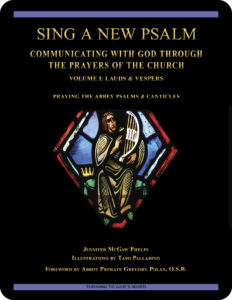 Sing a New Psalm:
Sing a New Psalm:
Communicating with God Through
the Prayers of the Church
Volume I: Lauds & Vespers
Lesson 14 Majesty Set Above the Heavens
Psalm 65 and Psalm 8
Saturday Lauds (Week I)
Revised Standard Version Catholic Edition (RSVCE)*
New American Bible Revised Edition (NABRE)*
Catechism of the Catholic Church
Rosarium Virginis Mariae (Rosary of the Virgin Mary)
ex libris (in our library)
next lesson: Let My Prayer Be As Incense
This material coordinates with Lesson 14 on pages 58–61 in Sing a New Psalm: Communicating with God Through the Prayers of the Church—Volume I: Lauds & Vespers. Our Catholic Bible study is based on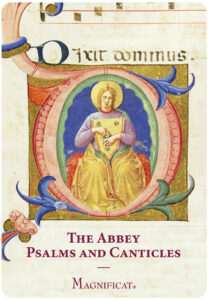 The Abbey Psalms and Canticles, an English translation of the Psalms prepared by the monks at Conception Abbey in 2010 and first published as The Revised Grail Psalms. The Abbey Psalms and Canticles is a revision of that work, finished in 2020 and published by the United States Conference of Catholic Bishops (USCCB). Wording and numbering of some Psalms and verses in other translations may differ. This new translation of the Psalms in the process of being added to all English-language Liturgy of the Hours books used in the United States. The USCCB also plans a liturgical Bible based on the NABRE translation.
The Abbey Psalms and Canticles, an English translation of the Psalms prepared by the monks at Conception Abbey in 2010 and first published as The Revised Grail Psalms. The Abbey Psalms and Canticles is a revision of that work, finished in 2020 and published by the United States Conference of Catholic Bishops (USCCB). Wording and numbering of some Psalms and verses in other translations may differ. This new translation of the Psalms in the process of being added to all English-language Liturgy of the Hours books used in the United States. The USCCB also plans a liturgical Bible based on the NABRE translation.
“Unlike other prayers in sacred Scripture, the prayers contained in the Psalms are not inserted into a narrative story that specifies their meaning and function. Instead, the Psalms are given to the believer precisely as a text of prayer. Since they are the Word of God, the believer who prays the Psalms speaks to God using the very words that God himself has given to us. Thus, in praying the Psalms we learn to pray. The Psalms are a school of prayer.”—Pope Benedict XVI
welcome to our in-depth study of the Psalms
We invite groups and individuals to check out the sample first lesson from this 28- lesson Turning to
lesson Turning to  God’s Word Catholic Bible study. Our online study pages include additional questions, commentary, and prayers based on the Psalm texts. Sing a New Psalm: Communicating with God Through the Prayers of the Church—Volume I: Lauds & Vespers has been granted an imprimatur. A digital version of this study can be purchased from our website shop. Volume II: Vigils, Day Prayer & Compline is scheduled for publication in 2025. If you have a Bible-related question or comment, click on one of the “ask us your question” or “what do you think” buttons on any online study page.
God’s Word Catholic Bible study. Our online study pages include additional questions, commentary, and prayers based on the Psalm texts. Sing a New Psalm: Communicating with God Through the Prayers of the Church—Volume I: Lauds & Vespers has been granted an imprimatur. A digital version of this study can be purchased from our website shop. Volume II: Vigils, Day Prayer & Compline is scheduled for publication in 2025. If you have a Bible-related question or comment, click on one of the “ask us your question” or “what do you think” buttons on any online study page.
open with prayer
It’s always wise to begin any Bible study with prayer, whether reading the Scriptures alone or meeting with others in a discussion study group. You can pray using your own words, pray one of the Psalms in this lesson, or use one of the opening prayers on our website. We especially like the following:
Lord Jesus, you promised to send your Holy Spirit
to teach us all things.
As we read and study your word today,
allow it to touch our hearts and change our lives. Amen.
what does it mean to you that God’s majesty knows no limits?
The theme of this lesson is taken from Psalm 8. The illustration by Turning to God’s Word co-founder 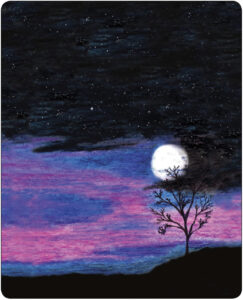 Tami Palladino captures a sense of the immensity of God’s Creation, which extends beyond earthly boundaries and even beyond the known universe. It comes as no surprise that Psalm 8 was the Scripture chosen in 1969 by Pope Paul VI to accompany American astronauts on their trip to the moon. Thousands of years after this Psalm was composed, its words continue to speak of the mystery surrounding the smallness of our human existence in contrast to the majesty of the God who created all things. What aspects of Creation most inspire you to praise God? For which of God’s gifts are you most thankful? Click on Tami’s illustration (right) to enlarge it. Her original illustration is on page 59 in Sing a New Psalm: Communicating with God Through the Prayers of the Church—Volume I: Lauds & Vespers.
Tami Palladino captures a sense of the immensity of God’s Creation, which extends beyond earthly boundaries and even beyond the known universe. It comes as no surprise that Psalm 8 was the Scripture chosen in 1969 by Pope Paul VI to accompany American astronauts on their trip to the moon. Thousands of years after this Psalm was composed, its words continue to speak of the mystery surrounding the smallness of our human existence in contrast to the majesty of the God who created all things. What aspects of Creation most inspire you to praise God? For which of God’s gifts are you most thankful? Click on Tami’s illustration (right) to enlarge it. Her original illustration is on page 59 in Sing a New Psalm: Communicating with God Through the Prayers of the Church—Volume I: Lauds & Vespers.
what’s nature wearing?
The Psalms frequently are anthropomorphic, ascribing human attributes to God. In Psalm 65, however the Psalmist describes features of the earth in terms of festive human attire. What do these terms suggest about the how the Psalmist views nature? What do they suggest about the attitude we should adopt when worshiping God? Read the Gospel According to Matthew 6:29 to learn how Jesus builds on the Psalmist’s idea of nature’s clothing to teach his followers an important truth about God.
 authority—you could look it up in our archives
authority—you could look it up in our archives
It’s not difficult to see how Psalm 65 and Psalm 8 point to the authority of Jesus Christ. Consider where Jesus’ authority is at work in your life. To learn more about the word “authority,” read Lost in Translation, an online column in which Turning to God’s Word author Matthew Phelps helps readers connect with ideas expressed in the original languages of the Scriptures. New Lost in Translation entries are posted on Mondays, and past entries are archived on our website. Contact us if you’d like to receive Lost in Translation by email every week.
DO YOU KNOW WHY God created the world?
 The Psalms for Saturday Lauds (Week I), Psalm 65 and Psalm 8, combine to praise God for the many ways in which he cares for Creation.
The Psalms for Saturday Lauds (Week I), Psalm 65 and Psalm 8, combine to praise God for the many ways in which he cares for Creation.
? Without consulting the following citations from the Catechism of the Catholic Church, do you know or can you guess the reason that God created the world?
read the Catechism—& learn two surprising things about Creation
Paragraph 760 in the Catechism of the Catholic Church explains Church teaching regarding the rather unexpected reason why God created the world. Many people assume that the world was created in a state of perfect completion. Paragraph 302 in the Catechism of the Catholic Church teaches differently.
 760 Christians of the first centuries said, “The world was created for the sake of the Church.” God created the world for the sake of communion with his divine life, a communion brought about by the “convocation” of men in Christ, and this “Convocation” is the Church. The Church is the goal of all things, and God permitted such painful upheavals as the angels’ fall and man’s sin only as occasions and means for displaying all the power of his arm and the whole measure of the love he wanted to give the world: Just as God’s will is creation and is called “the world,” so his intention is the salvation of men, and it is called “the Church.”
760 Christians of the first centuries said, “The world was created for the sake of the Church.” God created the world for the sake of communion with his divine life, a communion brought about by the “convocation” of men in Christ, and this “Convocation” is the Church. The Church is the goal of all things, and God permitted such painful upheavals as the angels’ fall and man’s sin only as occasions and means for displaying all the power of his arm and the whole measure of the love he wanted to give the world: Just as God’s will is creation and is called “the world,” so his intention is the salvation of men, and it is called “the Church.”
 302 Creation has its own goodness and proper perfection, but it did not spring forth complete from the hands of the Creator. The universe was created “in a state of journeying” (in statu viae) toward an ultimate perfection yet to be attained, to which God has destined it. We call “divine providence” the dispositions by which God guides his creation toward this perfection:
302 Creation has its own goodness and proper perfection, but it did not spring forth complete from the hands of the Creator. The universe was created “in a state of journeying” (in statu viae) toward an ultimate perfection yet to be attained, to which God has destined it. We call “divine providence” the dispositions by which God guides his creation toward this perfection:
By his providence God protects and governs all things which he has made, “reaching mightily from one end of the earth to the other, and ordering all things well.” For “all are open and laid bare to his eyes,” even those things which are yet to come into existence through the free action of creatures.
? What do you think about the role of the Church in an imperfect world?
? Consider what implications these Catechism paragraphs have on the way that you view the Church and your relationship to it.
? What implications do they have on the way that you view Creation?
 the popes inspire us—sovereignty of love
the popes inspire us—sovereignty of love
“A Sovereign Who Serves” on page 61 in Sing a New Psalm: Communicating with God Through the Prayers of the Church—Volume I: Lauds & Vespers is an excerpt from a general audience in which Pope St. John Paul II reflected on the power that God has given men and women over the works of his hands. The Holy Father sees in this a foreshadowing of Jesus, a sovereign who also consecrates himself in order to be of service to others.
ex libris—a book about seeing God in nature
Pilgrim at Tinker Creek by Annie Dillard won the Pulitzer Prize for its non-fiction description of natural life 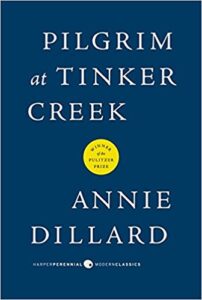 surrounding a creek in Virginia. The author, who
surrounding a creek in Virginia. The author, who  possesses exceptional observational skills as well as the ability to communicate what she sees, found much evidence for the existence of God during her explorations. Dillard’s book offers opportunities to inspire others in the art of seeing the divine in our natural environment. Read excerpts and learn more about Pilgrim at Tinker Creek and other works related to Bible study at ex libris—main bookshelf.
possesses exceptional observational skills as well as the ability to communicate what she sees, found much evidence for the existence of God during her explorations. Dillard’s book offers opportunities to inspire others in the art of seeing the divine in our natural environment. Read excerpts and learn more about Pilgrim at Tinker Creek and other works related to Bible study at ex libris—main bookshelf.
the best Catholic commentary about Scripture
 To find out more about how Church teaching is supported by passages in Sing a New Psalm: Communicating with God Through the Prayers of the Church—Volume I: Lauds & Vespers, check out the Index of Citations in the Catechism of the Catholic Church. Links to the primary Scripture passages in the lesson (Revised Standard Version Catholic Edition [RSVCE*]) and relevant paragraphs in the Catechism are provided here. Not every passage in the biblical text for this study is referenced in a Catechism paragraph, however, including Psalm 65 in this lesson.
To find out more about how Church teaching is supported by passages in Sing a New Psalm: Communicating with God Through the Prayers of the Church—Volume I: Lauds & Vespers, check out the Index of Citations in the Catechism of the Catholic Church. Links to the primary Scripture passages in the lesson (Revised Standard Version Catholic Edition [RSVCE*]) and relevant paragraphs in the Catechism are provided here. Not every passage in the biblical text for this study is referenced in a Catechism paragraph, however, including Psalm 65 in this lesson.
Psalm 8:1—paragraph 2160
Psalm 8:1–9—paragraph 2809
Psalm 8:2—paragraphs 300, 2566
Psalm 8:3—paragraph 559
Psalm 8:6—paragraphs 2566, 2809
don’t forget about our indexes & extra online material

 If you’re trying to locate information about a specific Scripture passage, you can look it up in the index at the back of the study book or sample lesson. If you want to find a particular commentary, you can look up its title in the topics index. To learn more about another book of the Bible for which there’s a Turning to God’s Word study, visit the online study directories to read the commentaries and watch any accompanying videos. Finally, if you have a question or would like to make a comment about any of our studies, you can use one of the “ask us your question” or “what do you think” buttons to email our authors.
If you’re trying to locate information about a specific Scripture passage, you can look it up in the index at the back of the study book or sample lesson. If you want to find a particular commentary, you can look up its title in the topics index. To learn more about another book of the Bible for which there’s a Turning to God’s Word study, visit the online study directories to read the commentaries and watch any accompanying videos. Finally, if you have a question or would like to make a comment about any of our studies, you can use one of the “ask us your question” or “what do you think” buttons to email our authors.
ex libris—Church documents & books about religious topics
Link to magisterial documents referred to in our Bible studies at ex libris—magisterial documents.  This listing includes significant recent encyclicals as well as a number of historical Church documents. Recommended books related to Scripture study can be found at ex libris—main bookshelf.
This listing includes significant recent encyclicals as well as a number of historical Church documents. Recommended books related to Scripture study can be found at ex libris—main bookshelf.
wondering how to pronounce some of these words?
The following links are to readings from the New International Version (NIV) Bible. To listen, open one of the links and click on the audio icon above the printed text. Although not taken from the translations used in our study materials, the NIV readings provide an audio guide to pronunciation of words in this lesson’s primary biblical texts. A close online version of the translation of the Bible used in Catholic liturgy in the United States as well as an audio guide for daily Mass readings for the current month can be found on the website of the United States Conference of Catholic Bishops (USCCB).
 close with a Psalms-based prayer for Saturday Lauds (Week I)
close with a Psalms-based prayer for Saturday Lauds (Week I)
Many of our Catholic study groups like to conclude their discussions with a prayer based on the scriptural focus of their lesson. If you’re uncomfortable composing your own Bible-based prayers, you can follow our four easy steps. If you prefer, you can pray any of the Psalms in this lesson, or you can use the following short prayer.
O majestic God of the universe,
you help us to see evidence of your immense love for us
in the beauty and mystery of our natural surroundings.
Grant that we may appreciate and properly care
for these great gifts that you’ve given us.
We ask this in the name of your Son, Jesus Christ,
your greatest gift of all. Amen.
Lesson 15 Let My Prayer Be As Incense, Sunday 1st Vespers (Week II)—Psalm 141, Psalm 116:10–19, and Psalm 16
Lesson 13 Our Help Is in the Name of the LORD, Friday Vespers (Week I)—Psalm 41, Psalm 124, Psalm 129, and Psalm 130
you also may like our study of Scripture & the Rosary (digital only)
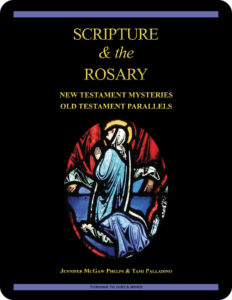 Scripture & the Rosary: New Testament Mysteries, Old Testament Parallels, a 26-lesson Catholic Bible study with an imprimatur, looks at the biblical foundations of the Rosary. The study includes lessons on Pope St. John Paul II’s Rosarium Virginis Mariae (Rosary of the Virgin Mary), the Apostles’ Creed, and the Luminous Mysteries as well as the original 15 Mysteries of the Rosary. Color photographs of stained glass windows depict key scenes in the lives of Jesus and Mary. Free digital lessons rotate throughout the year on our website.
Scripture & the Rosary: New Testament Mysteries, Old Testament Parallels, a 26-lesson Catholic Bible study with an imprimatur, looks at the biblical foundations of the Rosary. The study includes lessons on Pope St. John Paul II’s Rosarium Virginis Mariae (Rosary of the Virgin Mary), the Apostles’ Creed, and the Luminous Mysteries as well as the original 15 Mysteries of the Rosary. Color photographs of stained glass windows depict key scenes in the lives of Jesus and Mary. Free digital lessons rotate throughout the year on our website.
start a Turning to God’s Word Bible study
Thank you for your interest in Sing a New Psalm: Communicating with God Through the Prayers of the Church—Volume I: Lauds & Vespers. 
 More information about beginning a Turning to God’s Word Bible study can be found on this website at start a Bible study, and Tami, Matthew, and I are available to answer questions or discuss concerns. Contact us to start this or one of our other studies or to have your schedule listed with other TtGW study groups on our website. —Jennifer
More information about beginning a Turning to God’s Word Bible study can be found on this website at start a Bible study, and Tami, Matthew, and I are available to answer questions or discuss concerns. Contact us to start this or one of our other studies or to have your schedule listed with other TtGW study groups on our website. —Jennifer
*There are seven deuterocanonical books in the Old Testament—the Books of Tobit, Judith, Wisdom, Sirach, Baruch, and First and Second Maccabees, as well as some passages in the Books of Esther and Daniel. Protestants usually refer to these works as “apocryphal,” a word that means “outside the (Protestant) canon” because they’re excluded from most Protestant Bibles. The word “deuterocanonical” means “second canon”; Catholics use that word to refer to any section of the Catholic Old Testament for which there are no extant, or existing, Hebrew manuscripts. All of the deuterocanonical books appear in the Septuagint, the earliest remaining versions of which date to the 1st century B.C. This Greek translation of the Old Testament was in common use by Jews at the time of Jesus. Learn more by reading How Do Catholic & Protestant Bibles Differ?
Turning to God’s Word printed Bible studies use the 2006 Revised Standard Version Second Catholic Edition (RSV2CE) translation for all Scripture references except the Psalms, which are taken from The Abbey Psalms and Canticles, prepared by the monks of Conception Abbey and published in 2020 by the United States Conference of Catholic Bishops (USCCB). All Scripture links for the online study pages for Sing a New Psalm: Communicating with God Through the Prayers of the Church—Volume I: Lauds & Vespers are to the 1966 Revised Standard Version Catholic Edition (RSVCE) translation. The New International Version (NIV) audio recordings follow the same chapter and verse numbering as the RSV Catholic translations, but the NIV doesn’t include the deuterocanonical passages.
The 1966 RSVCE uses archaic pronouns and verb forms such as “thee,” “thou,” “didst” in the Psalms and in direct quotations attributed to God. The 2006 RSV2CE replaces these with more accessible English. The few significant translation changes in the RSV2CE include rendering almah as “virgin” in the Book of Isaiah 7:14 and restoring the term “begotten” in the Gospel According to John 3:16.
The Psalms in this Bible study reflect numbering used in The Abbey Psalms and Canticles; Psalms numbering may vary in other translations. Numbering also may vary for a few other passages in this Bible study. Turning to God’s Word studies follow the numbering in the Revised Standard Version Catholic translations (RSVCE and RSV2CE). Discrepancies in the New American Bible Revised Edition (NABRE) are noted in the Index of Scripture Citations in the study book and the online sample.
 The companion to this Catholic Bible study from Turning to God’s Word, Sing a New Psalm: Communicating with God Through the Prayers of the Church—Volume II: Vigils, Day Prayer & Compline, will cover Psalms not included in Volume I: Lauds & Vespers. Volume II: Vigils, Day Prayer & Compline is scheduled for publication in 2025.
The companion to this Catholic Bible study from Turning to God’s Word, Sing a New Psalm: Communicating with God Through the Prayers of the Church—Volume II: Vigils, Day Prayer & Compline, will cover Psalms not included in Volume I: Lauds & Vespers. Volume II: Vigils, Day Prayer & Compline is scheduled for publication in 2025.
